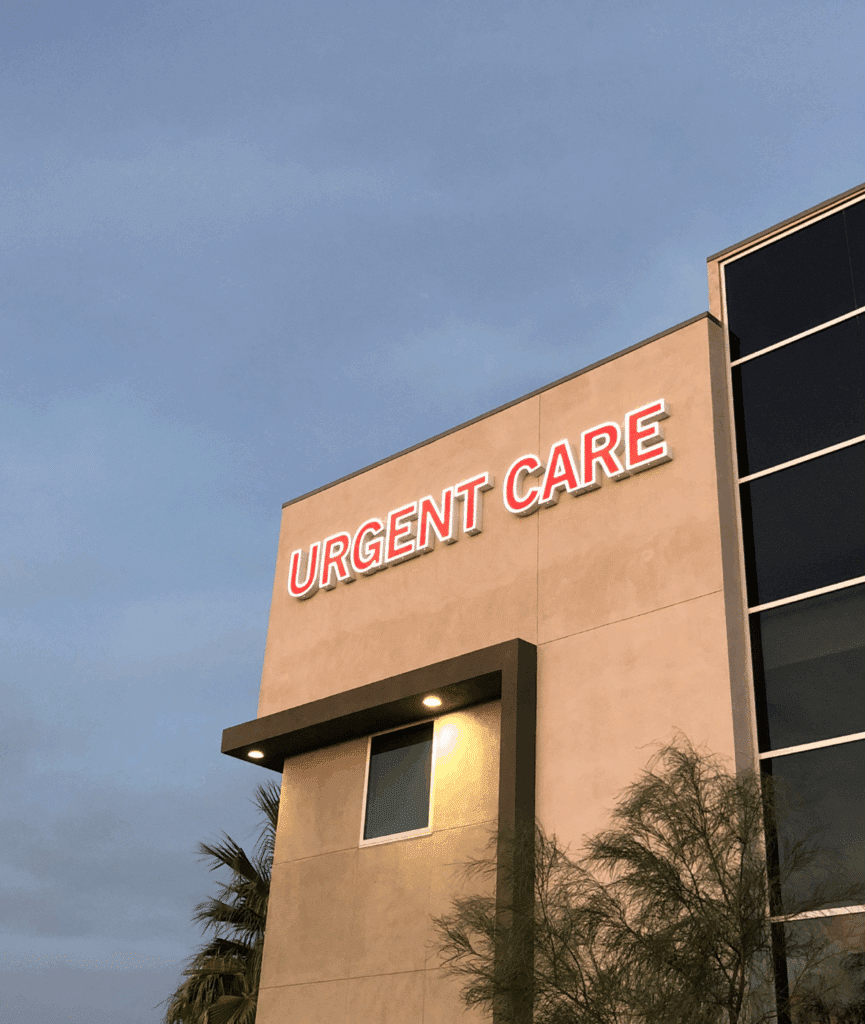Mental Health Referrals From Urgent Care Clinics: From Crisis to Ongoing Support

As our understanding of mental health grows, so do the tools and facilities that support recovery and stabilization. Urgent care centers are a relatively new addition to this toolbox, but they’ve been increasing across the US for good reason.
These clinics can bridge the gap between urgent mental health care and longer-term recovery, ensuring that there’s continuation of care to support people experiencing mental health crises. If you’re concerned about how to continue care after a mental health crisis, a mental health professional can guide you on the next steps to take.
This page can also help you understand how referrals from urgent care clinics play a vital role in ongoing support by covering:
- What an urgent care center is
- Why urgent care centers are important for mental health emergencies
- Urgent care centers’ role in referring you to focused help
- Your autonomy in the referral process
- What happens if you’re referred to outpatient treatment
- How Mission Connection helps provide outpatient treatment

What Is an Urgent Care Center?
Urgent care centers for mental health were created to fill this gap. Instead of waiting in a crowded emergency room, someone in need can walk into an environment where the focus is on stabilizing symptoms, adjusting medications, or connecting with follow-up care.
To help give you a clearer picture, the people who might seek out this kind of urgent care support often include:
Someone dealing with depression that has become overwhelming, but who isn’t in immediate danger of self-harm- Anyone who has had a severe panic attack and needs help regaining control before returning to school, work, or home life
- An adult who has suddenly run out of medication over a weekend and cannot wait until their next appointment to get a prescription
These situations don’t necessarily require hospitalization, yet they do demand fast, compassionate attention. This is why urgent care centers have been steadily expanding across the country. In fact, in 2022, it was estimated that there were nearly 10,000 urgent care clinics for mental health issues.2 Their inclusion shows just how vital this middle ground has become in today’s mental health landscape.
Why Urgent Care Centers are Crucial for Mental Health Emergencies
The following paragraphs cover reasons why urgent care centers are so important for coping with mental health challenges.
Teams With Diverse Expertise
Most urgent care centers bring together professionals such as nurses, psychologists, social workers, mental health counselors, psychiatrists, and internists to help with each unique case.3 It’s this multidisciplinary mix that can make the treatment more effective than simply visiting the ED.
For example, a person walking into an urgent care center during a depressive spiral may find comfort in speaking to a counselor straight away. In another situation, someone dealing with the side effects of medication may be assessed by a nurse or internist without delay.
Because the team works together under one roof, the handover from one professional to another is seamless. This can leave patients feeling as though they’re not being pushed around a system that doesn’t understand them.
Care Available in the Community
Many urgent care centers are based in the community rather than inside hospitals, which can instantly change the atmosphere.
The idea of walking into a large hospital building can feel overwhelming, so having a local option nearby can create a softer entry point into care. Therefore, these community spaces encourage people to reach out before mental health conditions escalate, turning the whole process into a more approachable step toward getting the right support.3
Strong Collaboration With Hospitals
There are also urgent care centers that sit within hospital departments, often alongside emergency rooms or outpatient clinics.3 This setup brings the obvious advantage of being able to draw on hospital resources and coordinate quickly with medical staff when a situation calls for it.
Adaptation to Community Needs
Research from community urgent care centers shows how some reshape themselves to meet the needs of the local community.3 For example, if the center is based in a city, they may put more focus on crisis intervention and relapse prevention. A rural center, on the other hand, may lean more heavily on family support and ongoing continuity of care.
By adjusting in this way, urgent care centers avoid offering a one-size-fits-all service and instead create something that feels responsive to the well-being of those who walk through their doors.
If you’re experiencing mental health difficulties and have access to an urgent care center in your area, stepping through those doors could be the best decision you make. These centers are designed to give the right kind of help when you need it most, and serve as a bridge to long-term care.
Urgent Care Centers' Role In Mental Health Referrals
Urgent care centers for mental health are designed to offer immediate relief when someone is struggling, but their role doesn’t end there. Part of their purpose is to recognize when short-term care at the center isn’t enough on its own, and to guide people toward the next level of support.
In these moments, referrals to inpatient, outpatient, or residential care can become the bridge to recovery that ensures no one is left without the help they truly need. The following information covers how referrals from urgent care clinics can work.
What Happens After an Initial Visit to the Urgent Care Center?
Robert Trestman of the APA pointed out that psychiatric issues are rarely resolved in a single visit. This is why effective clinics build strong links with other providers of ongoing outpatient care.5
Once your immediate issue has been stabilized within the center, you may be referred to outpatient care. Outpatient programs are designed to give you focused, longer-term treatment for the specific issues you’re facing, without needing you to stay overnight.
In outpatient care, you’ll attend regular therapy sessions or treatment appointments while continuing to live at home. The structure allows you to work through your challenges at a steady pace, while still being supported by professionals who understand your specific situation.
Urgent care centers play a vital role in speeding up this process, helping you connect with outpatient services more quickly so you don’t get delayed in the system.3
Inpatient Referrals From Urgent Care Clinics
For example, if you’re dealing with suicidal thoughts, psychosis, or overwhelming symptoms that make it unsafe for you to return home, inpatient care may be the right choice.4 This way, an immediately secure environment is opened to you.
The urgent care center you visited may be located within a hospital, and if this is the case, quicker access to an inpatient setting can be achieved. Once you’re stabilized, further assessments will help determine what the next steps are.
Residential Treatment Referrals From Urgent Care Clinics
In some cases, urgent care clinics may refer you to residential facilities if they have the ability to do so.
You might come in because your depressive symptoms have worsened, or because your anxiety is becoming difficult to manage even with medication. In situations like these, staff can provide immediate support to ease your most pressing symptoms. However, they may also see that a longer-term environment could give you the best chance to move forward.
This is when a residential program referral may be offered. Residential programs don’t carry the intensity of a hospital setting but instead provide you with round-the-clock care in a more homelike setting.
In these centers, specialized therapy and structured routines are interwoven into daily life, offering you a steadier pace of recovery. The calm, supportive environment allows you to step away from daily pressures and focus on your mental health, while still knowing that professional help is always available when needed.
Do I Have to Take a Referral From Urgent Care Clinics?
When you’ve been referred to an outpatient program or a residential setting, you might feel torn about whether to follow through. The reality is, you don’t have to take the referral, as the decision is always yours. But when professionals who’ve seen this process play out countless times suggest that a particular step is right for you, it’s worth pausing before you brush it aside.
Think of it like being told by a doctor that you’ve fractured a bone in your foot. Technically, you could keep walking on it without treatment, but you’d be taking a risk that could make things worse down the road. In the same way, ignoring a referral may mean that while your immediate crisis has eased, the underlying struggles are left unresolved.
The ball is firmly in your court, but the guidance is there for a reason. Outpatient and residential care are offered because they give you the best chance to keep moving forward rather than slipping back. In situations like this, the safest bet is usually to take the advice and give yourself the opportunity to recover with proper support.
Mission Connection: Continued Care After Referrals From Urgent Care Clinics
After an urgent care visit, you may be referred to an outpatient programme for longer-term support. In some situations, this could mean being connected with a service like ours at Mission Connection.
At Mission Connection, we provide outpatient options designed to help people move forward after a crisis or simply when everyday life feels too heavy. Our intensive outpatient programs (IOP) and partial hospitalization programs (PHP) are available across the US and give you the structure to continue recovery while living at home.
We regularly work and treat people managing challenges such as:
- Trauma
- Depression
- Bipolar disorder
- Anxiety
- Schizophrenia
- Psychosis
- Self-harm
- Anger issues
Treatments for these types of mental health conditions are based on evidence-backed therapies like CBT and DBT, along with other therapeutic approaches like group therapy or family therapy.
For those who can’t always attend in person, we also offer telehealth options, ensuring therapy remains consistent and accessible wherever you are.
Whether you’ve just been referred from urgent care or are looking for support on your own, Mission Connection can provide the bridge you need. Reach out today and start building a treatment plan that works for your life.

Frequently Asked Questions About Urgent Care Clinic Referrals
If you’ve attended an urgent care clinic for your mental health, you may still have some concerns about how to continue looking after your well-being. The following responses to frequently asked questions about urgent care clinic referrals may help.
What Kind of Mental Health Referrals Can Come From an Urgent Care Clinic?
Urgent care centers may recommend outpatient, inpatient, or residential programs depending on what you need. The goal is to make sure you’re not left adrift after your visit but, instead, are connected to the right care.
How Does the Urgent Care Therapy Referral Process Work?
After you’ve been stabilized, the urgent care team will likely sit with you to discuss ongoing treatment options. They might explain why a referral is being suggested and help connect you, so you’re not left searching for support alone.
Can an Urgent Care Visit Lead to Inpatient Mental Health Care?
Yes. If your symptoms are severe enough that it isn’t safe to return home, staff may refer you to inpatient treatment. These short stays can provide a structured environment where you will be supported until stabilized.
What Happens if I’m Referred to a Residential Program From Urgent Care?
Residential care is usually offered when outpatient therapy isn’t enough, but hospitalization isn’t required. It gives you a calm, homelike environment where therapy and daily routines combine to support your recovery at a steadier pace.
References
- Villas-Boas, S., Kaplan, S., White, J. S., & Hsia, R. Y. (2023). Patterns of US Mental Health–Related Emergency Department Visits During the COVID-19 Pandemic. JAMA Network Open, 6(7), e2322720. https://doi.org/10.1001/jamanetworkopen.2023.22720
- Poyorena, C., Patel, S., Keim, A., Monas, J., Urumov, A., Lindor, R., Girardo, M., & Rappaport, D. (2022). Evaluating urgent care center referrals to the emergency department. Journal of the American College of Emergency Physicians Open, 3(6). https://doi.org/10.1002/emp2.12838
- DuPerry, K. C., Siber-Sanderowitz, S., Hill, E., Cintron-Arroyo, M., Glasgow, A., & Vileisis, J. (2025). Acute Needs, ACUTE Response: Development and Delivery of a Mental Health Urgent Care in the Bronx. Community Mental Health Journal. https://doi.org/10.1007/s10597-024-01448-3
- Johnson, S., Dalton‐Locke, C., Baker, J., Hanlon, C., Salisbury, T. T., Fossey, M., Newbigging, K., Carr, S. E., Hensel, J., Carrà, G., Hepp, U., Caneo, C., Needle, J. J., & Lloyd‐Evans, B. (2022). Acute psychiatric care: approaches to increasing the range of services and improving access and quality of care. World Psychiatry, 21(2), 220–236. https://doi.org/10.1002/wps.20962
- Walk-in clinics tackle urgent mental health needs. (2024). AAMC. https://www.aamc.org/news/walk-clinics-tackle-urgent-mental-health-needs
